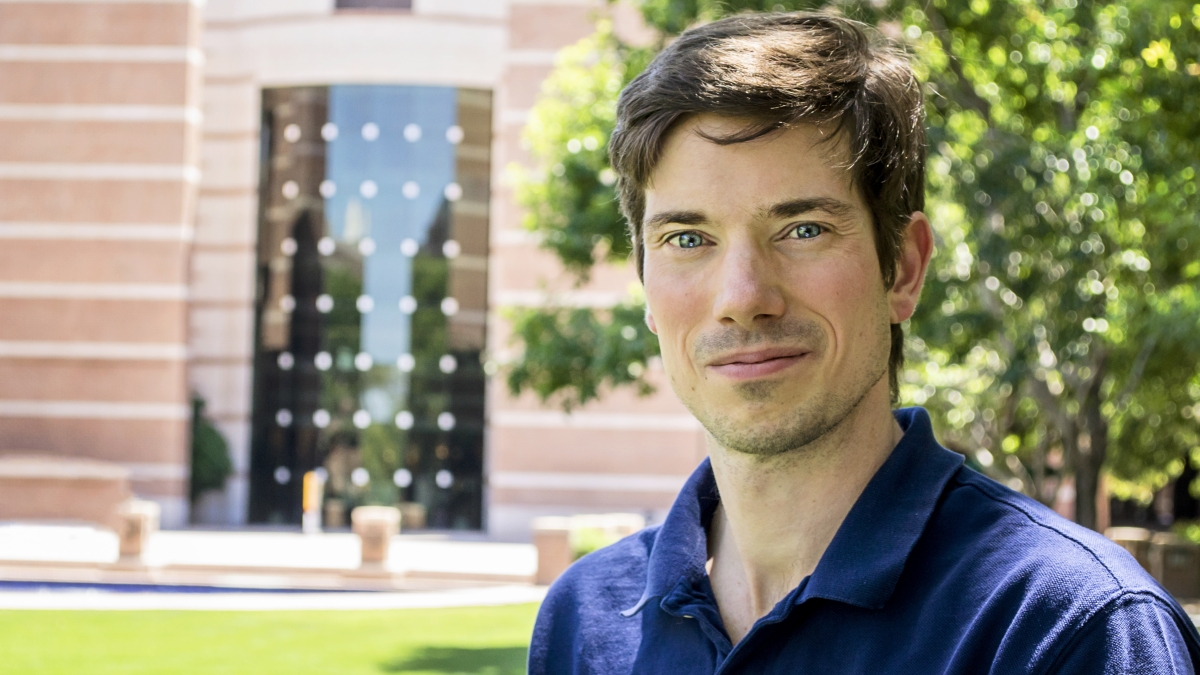Editor's note: This is part of a series of profiles for spring 2016 commencement. See the rest here.
Michael Montpetit draws strength from what others may see as a challenge. Montpetit self-identifies as having an autism spectrum disorder, or ASD, and he is passionate about advocating for others who are going through some of the same struggles he has.
The communications masters student from Port Huron, Michigan, was chosen as one of the New College Outstanding Graduate Students for the Class of 2016 in part because he has become a role model for students in the ASU community.
Question: What was your “aha” moment, when you realized you wanted to study the field you majored in?
Answer: As an undergraduate at Michigan State University, I knew I wanted to go to grad school so I could teach within academia and learn more about how autistic adults live and function within society. There is quite a bit of research that focuses on children and autism, but not really adults who are on the spectrum. Since I am on the spectrum, I believe at times that having an ASD inhibits me, and I hypothesized that there are other people who have an ASD that feel the same way. These people don't just disappear, become cured or assimilate. I thought this is an area of study that would benefit the scientific community, and research needs to be conducted to truly understand what it is like to be an adult with an ASD.
Q: What’s something you learned while at ASU — in the classroom or otherwise — that surprised you, that changed your perspective?
A: While doing research for my thesis, which was on having an ASD and being within a romantic relationship, I discovered that those who are on the spectrum can successfully find love and be in a monogamous relationship. I did hear stories about how being on the spectrum made finding love very difficult, but I also heard stories of triumph or overcoming their disorder to cultivate a relationship. I was really surprised when I found out how successful many of my research participants were at intimate relationships by believing in themselves, trusting their partner and finding a way, sometimes very unconventionally, to make their relationship work. Having an ASD, or any disorder, is only a hindrance if you believe it to be. If you are positive, you can find ways to overcome it.
Q: Why did you choose ASU?
A: When looking for graduate programs, I was advised to locate instructors who have performed research within my field of interest and see where they teach. While searching for research on the communication of individuals with an ASD, I came across Dr. Majia Nadesan at ASU New College and reached out to her. We talked over the phone, and she piqued my interest into coming here.
Q: What’s the best piece of advice you’d give to those still in school?
A: Plan ahead, establish good rapport and relationships with your instructors early on, and never give up! It will get hard and at times seem insurmountable, but in the end, it will all be worth it.
Q: What was your favorite spot on campus, whether for studying, meeting friends or just thinking about life?
A: Because I study and reside on the West campus, I spend much of my time there. My favorite spot to study is the third floor of Fletcher Library. There is a quiet area with computers to browse the internet or write papers, and the offices of the librarians are nearby just in case I needed help or guidance.
Q: What are your plans after graduation?
A: I plan on working toward my PhD someday. But before I do, I would like to work for a nonprofit agency that specializes in learning more about autism and helping those who possess this disorder.
Q: If someone gave you $40 million to solve one problem on our planet, what would you tackle?
A: I would fund projects designed to foster more understanding about what it is like to be an adult and possess an ASD. If more researchers study these concepts, then better support services can be put into place to help these people self-actualize vocationally, relationally and personally. Perhaps, it may reverse thinking that people who are on the spectrum disappear or assimilate.
Top photo by Ruth Dempsey
More Sun Devil community
Founders’ Day 2025 celebrates legacy and innovation at ASU
"Honor the past, celebrate the present and invent the future." This motto encapsulates the spirit of Founders' Day, a signature event hosted by the Arizona State University Alumni Association to…

ASU preps America's veterans for what's next
Every year, over 200,000 active-duty military members trade their uniforms for civilian attire as they embark on the next chapter of their lives filled with both promise and uncertainty.The shift…
Red Cross president, Pulitzer Prize finalist to speak at ASU's spring commencement ceremonies
A Pulitzer Prize finalist for poetry and an Arizona State University graduate who is the president of the International Federation of Red Cross and Red Crescent Societies will be the featured…


